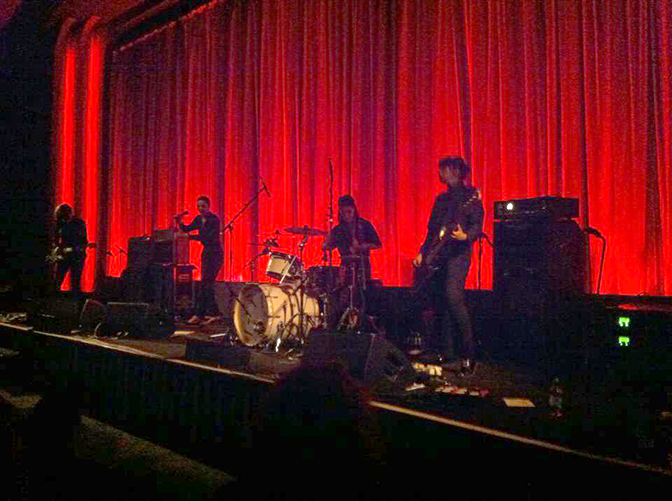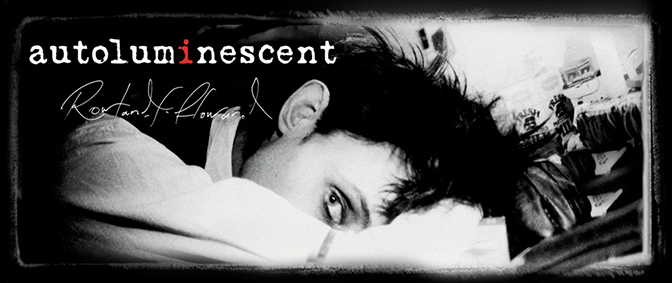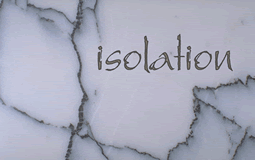
Autoluminescent
A documentary on Rowland S Howard
Savages and HTRK Live
British Film Institute, London
There’s a beautiful through line to this event, part of the BFI's ‘Sonic Cinema’ series. We start with a documentary about the late Rowland S Howard, a founder member of The Birthday Party, who is cited by everyone from Sonic Youth to Primal Scream for his role in the development of the guitar as a sonic force, then move to a live performance from Melbourne’s HTRK, who worked with Howard as a producer, and then to Savages, whose sound can clearly be mapped through a lineage that leads directly back to Howard. It’s a clever event, moving from the informational to the experiential – left brain to right, mind to body.
So given that it is what marketers might call ‘an integrated experience’ let's start with a review of the whole. As a concept, a package, a holistic experience, this event was quite brilliant. The audience left not only knowing more about a gifted and deeply troubled human being but also feeling they had experienced his legacy. And that is where we can perhaps start to pull the thing apart, as that legacy was manifest in the headlining performance from a very in-form Savages. There is something extremely primal and female about them – they are both contained and unconstrained in equal measure. Decked out in their traditional all black, with just one lick of red (singer Jehnny Beth’s shoes), playing against a deep blood red curtain in front of the BFI’s main screen, they look like an installation representing female sexuality. This is a venue that probably better matches Savages’ art rock pretentions than many a bigger space. They were mesmerising to watch, like all great bands, each member fabulous, and together making something greater than the parts. Given the band is clearly driven by queen bee lead singer Beth, whose presence dominates the space, perhaps surprisingly if there is any weak link to their armour it is her voice – it has a growling, soaring quality reminiscent of an early Patti Smith, but without the depth and range. It is a voice that feels like it might go to 8 rather than 11 and just might be the difference between Savages being a great band and a legendary one. But then again, there is a nagging feeling that it might just seem that way as she clearly doesn’t want to let go. Surrender is not a word in Savages' vocabulary, but if she loosened her grip enough to let rip then some of the perfection might be lost but in its place something truly spectacular might result.
Still though they are awesome. Some have called them ‘over controlling’ but that is to miss the point. This is art rock at its best and thus the self curation of the band rather than a more standard ‘here I am naked’ approach of a straight up guitar rock band is appropriate. They are as much ‘an act’ as ‘a band’.
This desire to be orchestrators shows up – thankfully – when at the end of the first song Jehnny moves to the front of the stage, squats down and gestures to the five middle aged men who broke ranks with the otherwise seat-bound audience and started to dance ‘up the front’. Exactly what she said remains a mystery but the result is they all sit down, seemingly content. Again you could call this controlling, but in reality it is good management. There is something rather unseemly about having to watch the backs of five lumpen middle aged men bump and grind in front a band of young, attractive women – something of the grubby peep show about it and not in an ironic, glossy, Warholeque way, but in a way that makes your skin creep. It was the event's one ‘awkward moment’ and was handled with such deftness that it didn’t become an issue.
Perhaps in keeping with Savages self-management the whole set works, there are no stand-outs, just a seamless showcase of their best songs, each building on the last, the thumping bass and angry drumming of Ayse Hassan and Fay Milton slowly seeping into your soul, synchronising your heartbeat and breathing, so the edgy, soaring guitar and vocals could work their magic. The more they play the more the audience is transfixed. This is a band on the way from cult success to something bigger, a transformation that will either see them become more mainstream or implode. Catch them now if you can for they are a band at a perfect point in their development: beautiful and professional, but still with the sweet flesh of something young and not fully mature.
It might seem a bit mean spirited to call HTRK the filler, but they did feel that way, not because of any lack of talent on their part, but because the content on both sides of them was so strong. Their main contribution, apart from a brilliant cover of Howard's 'Dead Radio' from his excellent Teenage Snuff Film album, is in the Q&A beforehand when singer Jonnine Standish’s considered and intelligent answers to the audience’s questions helps to deliver a real feel for what was so mesmerising about the legendary guitarist.
And so to the film. Autoluminescent succeeds well in telling a story of an artist in a particularly non-artistic way. The format is of a very standard modern doco with talking heads spliced in with old footage and it wouldn’t look out of place next to the slew of cheaply made documentaries on TV about everything from Dad’s Army to boy bands. What it therefore shows is the power of good content because it is a very good documentary indeed, steering you through the rise, fall, and ultimate demise of Howard in an informative and deeply touching way. Seeing and hearing his friends and ex lovers sound and look so mundane brings a realness to what could easily have become a fantastical homage. The biggest surprise is how much of a luvvy Nick Cave appears to be – shirt open one button too far, tanned, with an accent that dances around between England, Australia and somewhere in the USA, telling funny tales of ex girlfriends in a seemingly self deprecating way. Still, he has every right to be self congratulatory – it is clear that he is the one person that comes out of the whole thing intact and successful. Everyone else seems battered. Or in the case of Howard, dead.
In a world where bands and careers are now so planned and managed, Howard’s life can seem like a shambles. He wrote one of his most successful songs 'Shivers’ aged 16, had an explosive if out of control period of growth in Europe and the USA in the 80s, and ended up dying of liver cancer having been playing to small audiences at country shows in Australia. The film documents his drug addiction well, showing how he eventually quit to battle against Hepatitis C, but failed to survive long enough to make it through to a transplant.
But what it also shows is his genius and how perhaps true genius does often have to come out of some form of chaos. Watching the performances of The Birthday Party, especially when they were in Berlin, is utterly breathtaking. Howard’s guitar was quite simply an expression of the pain he clearly felt so deeply, so overwhelmingly, so honestly, that even when he held a single note for what seemed like hours it resonated deeply in your soul. Like a Rothko painting the feeling stumbles from somewhere behind what seems like a very simple format.
Rowland S Howard was something that is now in very short supply – a genuinely unique, brilliantly intuitive artist, whose art came directly from his soul, not through some attempt to make gestures or look the part. It is clear why so many women wanted to look after him – he was so fragile and raw. Nothing about what he did was thought through or planned. Like so many doomed seminal forces it seems tragic that he was never able to either benefit from or probably truly appreciate the scale of his legacy. Without him there would be no Black Flag, no Sonic Youth, no Nirvana, no My Bloody Valentine and no Savages ... or certainly not in the way they have turned out. Gratitude is due.
Words and Pic, Neil

Isolation on Facebook. Please like us.
Isolation contact


